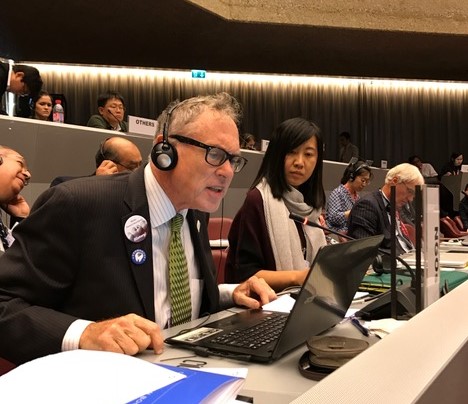In a message delivered to Plenary Session on Monday, March 21, 2022, at the ongoing second segment of the fourth Meeting of the Conference of the Parties to the Minamata Convention on Mercury (COP-4.2) holding in Bali, Indonesia, the World Alliance for Mercury-Free Dentistry (WAMFD) has called for an end to amalgam use for children and pregnant women.

President of WAMFD, Charlie Brown, urged the gathering to make dental amalgam history to protect “women, children and our planet”.
He said: “Here is our time to end amalgam for children and pregnant women. Here is our time to write a game plan, a flexible road map for the end of amalgam. The best treaty of the 20th century was the Montreal Protocol.
“For the 21st century the best one can be the Minamata Convention – the best. The ideal treaty on toxics. But it cannot be the best if this Convention goes home Friday with not deadline to implanting mercury into the mouths of children.”
Stressing that the preamble to the Minamata Convention focuses on children, on women, and on future generations, Brown, an attorney, added: “To follow the very purpose of this Convention, this Convention should amend the amalgam section to provide special protections for children and for pregnant and breastfeeding women.
“Anyone who tells this conference that you must put mercury in children’s mouths instead of nontoxic alternatives is flying in the face of facts. If 40 countries can stop amalgam use in children, well, so can all of us. Indeed, the Secretariat in its report makes clear alternatives work, that alternatives to amalgam.”
He listed nations like Vietnam, Philippines, and New Caledonia. Tanzania Mauritius Zambia, Deutschland, France, the UK, Moldova, Slovenia, Spain, and St Kitts & Nevis as being among jurisdictions that do not allow amalgam use in children.
“Many more, like Canada and the United States, have official recommendations from their health ministry to stop amalgam use in children,” he stated, saluting the Africa Region and European Union.
“The World Alliance salutes the Africa Region for its leadership from the start of the negotiations. Now the region steps forward with a realistic plan to move the world toward or to mercury-free dentistry. We are deeply grateful to all 54 governments.
“The World Alliance salutes the European Union and its 27 Member States for its plan to move our world toward mercury-free dentistry via focus on ending amalgam use in children, pregnant women, and breastfeeding women.
“Madame president, greetings from the World Alliance for Mercury-Free Dentistry. It is our honor to be at COP4.2 here in Bali, Indonesia and benefit from your wondrous hospitality.
“The World Alliance for Mercury-Free Dentistry salutes the World Health Organisation. After a careful and comprehensive review, WHO calls a worldwide switch to minimally invasive dentistry. WHO makes clear that the alternatives are minimally invasive and that amalgam is not minimally invasive. The alternatives are tooth-friendly, amalgam is tooth unfriendly.”
On the amendment proposal of dental amalgam the Africa Region group stated that the continent has submitted a proposal to gradually phase out the use of mercury in dentistry in a gradual manner, and proposes to begin with end dates in the use of amalgam for vulnerable populations specially for women and children.
“In view of the objectives of the Convention, we consider it important that parties have national plans for a gradual phase out. The region also wishes to address the manufacture, import, domestic use and sale of this toxic chemical in the coming year,” it stated, adding:
“Our appeal is to ensure that the ultimate goal of protecting human health and the environment from mercury emissions and releases from the dental sector, is adequately met. We believe that the adoption of the amendment proposal on dental amalgam will serve humanity.
“In this regard, we would like to express our openness and flexibility to work with delegates from other regions. We are therefore ready to work in a contact group if such is to be established.”
The COP started its second segment in Bali, Indonesia with an opening ceremony that featured welcoming remarks by Wayan Koster (Governor of Bali Province, Indonesia), Inger Andersen (Executive Director of the UN Environment Programme), Monika Stankiewicz (Executive Secretary of the Minamata Convention on Mercury), Siti Nurbaya Bakar (Minister of Environment and Forestry, Indonesia) and Rosa Vivien Ratnawati (President of COP4, Indonesia).
Stankiewicz stressed the importance of the work ahead with a tight agenda covering topics like the effectiveness of the Convention, the use of mercury in products and manufacturing processes, mercury releases, waste, national reporting, international cooperation, mainstreaming gender, and more.
The Executive Secretary concluded with a hope that “through the example that we undertake this week, our young Minamata Convention family contribute to the strength of multilateralism and dialogue in overcoming differences and affirm our unity as a community of nations.”
After the opening ceremony, the Bali Declaration on Combatting Global Illegal Trade of Mercury was announced during a ceremonial launch. Ambassador Muhsin Syihab (Ministry of Foreign Affairs, Indonesia) read a summary of this non-binding political declaration that calls “upon parties to enhance international cooperation and coordination to increase national capacity to combat illegal trade in mercury”.
He was accompanied by Siti Nurbaya Bakar, Monika Stankiewicz and Carlos Manuel Rodríguez (CEO of Global Environment Facility, GEF).
